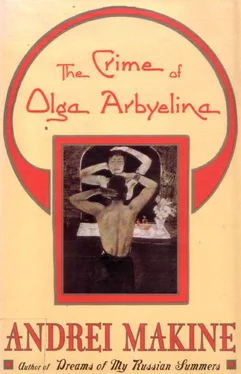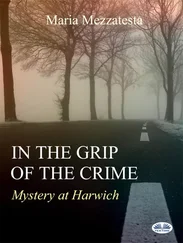The little station at Villiers-la-Forêt was deserted. The arrival and departure times on the timetable board reminded her with cruel grotesqueness of the figures in the box about the hangings. She crossed the square, which was surrounded by plane trees, and turned toward the lower town. The vibration of the rails hung for a moment in the silence of the evening…
The day she had just lived through was overflowing with complete madness. A madness that was nevertheless reassuring because everyone accepted it as life. You had to do as they did. To be happy, as she had been that morning, playing the role of the Princess Arbyelina offering her condolences. To tolerate those passengers who got a thrill from the vial passing through the mesh in a prison visiting room during a long, wet kiss. For months they had been learning in their newspapers about the countless millions of people killed, burned alive, gassed. And now all History had boiled down to a woman pushing a tiny vial between a man's lips with her tongue…
She went home almost serene. As she climbed up the little wooden steps she managed to look at the flower bed beside the wall with no special emotion…
That same evening, however, an apparently inoffensive detail upset her equilibrium… She was combing her hair in front of the mirror in her room. The smooth action of the comb was pleasantly emptying her mind. And as she gazed, lulled by her own reflection, she saw the door shudder softly and stop halfway. This silent half-opening caused by a gust of air from an open window created a strange expectation. Olga remembered that night when a draft had awoken her as it made her bedroom door creak, yes, it was the night of the three snapshots taken by the book-camera. For as long as she could recall, that door had always creaked slightly (in any house there is always one knife that cuts better than the others and one chair that you avoid giving to guests). But this time the door had opened noiselessly… Olga put down the comb and, with a keen sense of wantonly committing a dangerous act, she went out into the corridor, pulled the handle toward her, then pushed the door open again. It swung through its arc and came to rest against the little doorstop nailed to the floor. In silence. Without emitting the slightest creak. Olga became aware of an icy tension in her temples, as if her hair were stuffed with snow. She repeated the action. The door swung, opened wide. Without a murmur. Olga had the feeling that all this was happening outside her normal life. In one of life's strange back rooms. She bent down and touched the lower hinge, then the hinge at the top. In the glow of the lamp her fingers glistened. The oil was clear, almost without any trace of grease. Recent… The snow in her hair seemed to melt into a ferment of little burning sparks. She pushed against the door one more time with a slow sleepwalker's action. Her eyes fixed on the hinges, holding her breath, she waited for an interminable second. The door swung smoothly, neatly shrinking its shadow on the wall, like a hand reducing its angle on a clock face… Just before it touched the doorstop it emitted a brief groan. Olga leaned her hand against the wall and sat down on a little low stool in the corridor. She was breathing jerkily. Her bedroom beyond the open door had an unfamiliar look. It was like a hotel room, whose interior can be pictured in advance, but which, despite this, seems alien. The bed, the lamp on a shelf, the wardrobe with a mirror… She herself, seated outside the threshold, seemed on the point of leaving again. It took a muscular effort to banish the tense smile from her face-the delight at having rejected, or at least delayed, the final conclusion…
That evening she did not dare touch the door handle again and slept with the door wide open.
She spent the days that followed belatedly entering books in the catalog. And this mechanical work matched the tidying up that was gradually taking place in her mind. Even the daily routine of clipping together the newspapers, which had always been a burden to her, helped in coming to terms with life. She now found herself quickly reading through complete passages from one article or another. She enjoyed the sheer absurdity of them, which seemed to her the best possible proof that nothing could upset the common sense of human routine…
"The Fiihrer pretended to have a fit of hysterics every time anyone opposed him…" Interrupted by a visitor, she did not immediately find her place again in the text where she had broken off. Her eyes strayed over the neighboring columns. The complaint of the Parisian woman who in "Letters to the Editor" expressed indignation that "the plaques indicating street names are hidden by café awnings." Then a feature about a young actress: "Educated at the Des Oiseaux convent, she is currently appearing in Antoine and Antoinette. …" Locating the earlier article again, she discovered that it was the last confessions of Ribbentrop: "I cannot understand it. Hider was a vegetarian. He could not bear to eat the flesh of a dead animal. He called us Leichefresser, 'corpse eaters.' When I went hunting I even had to do it in secret because he disapproved of the sport. So how could such a man have ordered mass murders?"… The following page was devoted to a big diagram of a "plutonium bomb," with almost lip-smacking explanations of its murderous power. Before the next reader arrived Olga also had time to notice the photo of a young musician with a gleaming permanent wave. The caption read: "Romano Mussolini is a fine guitar player. The Duce's son is a young man who has forgotten all about the past and would like the whole world to do the same."…
The readers came in and deposited their books on the display shelves: this action served as a pretext for embarking on conversations. The former cavalry officer blamed the Americans for "letting Goering get away." Masha gave a whispered account of her secret trip to Nice, glancing repeatedly toward the door with exaggerated alarm. They all took the librarian's smile to be a sign of interest, but Olga was unaware that she was smiling as she responded inwardly to the deep echoes of her own thoughts. "I always thought wisdom consisted of pointing a finger at all the madness that escaped other people's attention. And it turns out that quite the opposite is true. You are wise if in some way you can turn a blind eye. If you don't eat your heart out tilting at this daily folly. If you can live with the reassuring falseness of words: war; criminals; triumph of justice; this innocent young guitarist who has forgotten the past; oh, and Masha, who doesn't care a hoot for the past because she has a beautiful body that gives and takes pleasure…"
Abruptly she surfaced from her thoughts. In front of the display shelves the director of the old people's home was talking about Xe-nia's funeral the next morning. "Well you know, Olga my dear, at our age (you're much younger than me, of course) one can't help wondering: Will I be the next to go?"…
During these days of tidying up she also managed to explain how her son's sudden maturing had passed her by unnoticed. The excuse of the war took on an arithmetical simplicity: '39-45, six years. Six years of strange survival when everything that could protect her child had disappeared. Medicines, food, the increasingly grudging sympathy of other people… One particular memory came back insistently: returning from the market one bleak day chilled with rain. A dreary market, deserted, where a hunter had sold her-at an unbelievably high price, like all food at that time-a bird with speckled plumage and a beak stained with dried blood. Wrapped in a piece of paper, the bird seemed still warm, despite the fall wind. Its body was supple, almost fluid, on account of the very smooth feathers and the paucity of the flesh that lay beneath them… At one moment on the road Olga had to scramble onto the roadside to avoid the mud splashing up from the wheels of a convoy of army trucks. The strident laughter of a harmonica lashed her ears. She continued on her way under the low sky, in the rain. The body of the bird that had grown warm in the hollow of her hand was the only particle of life surviving in this universe of mud and cold… She had enough time to prepare the meal before the child, lying with his leg in a plaster cast, should ask her to show him the bird…
Читать дальше












